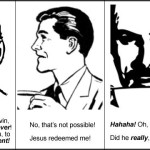We run our website the way we wished the whole internet worked: we provide high quality original content with no ads. We are funded solely by your direct support. Please consider supporting this project.

4 Reasons to Wake Up to the Warfare Worldview
Image by postbear via Flickr
A view of the world that grounds the problem of evil in spiritual warfare is not one that many modern people find easy to accept. To many contemporaries, the notion is preposterous that real, semi-autonomous, self-determining, and invisible spirits exist that can and do influence our lives. The whole thing sounds to them more like something out of a Star Wars movie than like serious contemporary theology.
Our perspective of the world has been colored by materialistic presuppositions, and this, up until recently, has been leaving less and less room for a belief in such things as angels and demons.
Outside of the fact that the Bible makes it clear that there is a real spiritual war transpiring, there are four reasons why we are poised to wake up to the reality of the warfare worldview:
- The Move Beyond Materialistic Assumptions. The dominance of the Enlightenment rationalistic and naturalistic assumptions concerning the nature of reality and the means by which we know it is rapidly waning. There is now an increasing openness to, if not explicit awareness of, “nonordinary reality.” We are becoming aware that the Western materialistic worldview is (as all worldviews to some extent are) a social construct. It is a construct that seems to have in part evolved precisely to censor out all aspects of reality that are not manageable by empirical techniques. But it thereby blinded us to those dimensions of reality that were beyond our control, including the world of the Spirit.
But this is changing. There is now an increasing appreciation for and validation of the “commonsense” assumption of nearly every culture outside our own that the world is not simply physical. Western culture is in many respects beginning to relearn what many primitive people have, in however a distorted form, never forgotten: The cosmos is a veritable society of intelligent interacting beings, some of whom are not physical.
- The Church’s Experience of Spiritual Warfare. Over the last 4 decades, we have witnessed major segments of the Western church abandoning wholesale their previous modernistic mindset, which held that spiritual warfare was at best peripheral to the life of the church. The overall result of this new spiritual climate is that the parameters of what many Western believers have previously regarded as being “normal” Christianity are being stretched. This is a positive development. It means that the climate is ripe for a restoration of a NT model of the church as the supernaturally empowered body of Christ that carries on the work which the Son began.
- The Questioning of the Classical View of Diety. We are now living in an age in which the classical views of God—that is, unmoved, impassible, immutable, nontemporal, and purely actual—are becoming less and less persuasive, if not altogether unintelligible, to people in Western culture. The notion that “divine perfection” necessarily implies changelessness, atemporality, pure actuality and impassibility is, at least in some quarters, no longer taken as self-evident. This rethinking of the nature of God provides greater opportunities to investigate whether these attributes are really biblical. The more these attributes are questioned, the more we can understand God and his relationship to the world to include the sort of contingency, openness and risk that is essential to a genuine warfare perspective of the world.
- The Experience of the Demonic. Arguably, never before has humanity as a whole experienced the amount, the depth and the intensity of evil that we experienced in the twentieth century. This reality has to affect our understanding of the reality of the spiritual battle. It makes simple answers and reassuring clichés harder to swallow. Consider the Holocaust. The depth of the evil despoils the myth of the divine blueprint, where we can presume that God controls everything. It can be rendered intelligible only by the category of the demonic.
I am convinced that our Western culture, and especially the Western church, is positioned to reconsider the warfare worldview of the NT and the early church—even through it runs contrary to certain fundamental aspect of both the Western church’s classical theological assumptions as well as our culture’s naturalistic orientation.
Category: General
Tags: Culture, Demons, Evil, Satan, Spiritual Warfare, Warfare Worldview, Western Assumptions
Topics: Spiritual Warfare, Cosmic Conflict
Related Reading

Analogies For Understanding Prayer
God is all-powerful, which means he owns all the “say-so” there is. But when he decided to populate the creation with free agents, he gave each human various units of “say-so.” [Click here for yesterday’s post on “say-so.”] We each have a certain amount of power to affect what comes to pass by our choices.…

Are angels involved in answering prayer?
READER: In Daniel 10 we read of an angel telling Daniel that he was delayed from giving him the answer to his prayer because of spiritual warfare going on. My question is, are angels always involved in answering our prayers?

Is There an Actual Satan?
Roger Olson wrote an excellent piece on how contemporary Christianity has tended to ignore or altogether extract Satan from the Biblical text. He explores some of the possible reasons for it and also discusses his own journey as he wrestled with the belief in the demonic realm. Really interesting. Here’s a personal experience of the…

God’s Aikido Way of Defeating Evil
Greg continues his thoughts on the atonement with this installment highlighting the way God uses the evil intentions and actions of his enemies to bring about good. And because this strategy is based in love, the demons who encountered Christ could not possibly imagine what he was up to. They ended up participating in their…

Engaging the Culture
Mark McIntyre shares some thoughts here on the culture wars that often define our relationship to the world outside of the Church. We are called to be a people who are known by our love rather than our stance on this or that social issue. Are we really known this way? Mark’s words are a…

